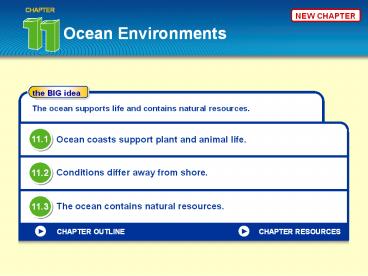Ocean Environments - PowerPoint PPT Presentation
1 / 11
Title:
Ocean Environments
Description:
hydrothermal vent. KEY CONCEPT. SUMMARY. Conditions differ away from shore. ... Examine the life found at hydrothermal vents. CHAPTER HOME. Image Gallery. BACK ... – PowerPoint PPT presentation
Number of Views:83
Avg rating:3.0/5.0
Title: Ocean Environments
1
CHAPTER
NEW CHAPTER
Ocean Environments
The ocean supports life and contains natural
resources.
11.1
Ocean coasts support plant and animal life.
11.2
Conditions differ away from shore.
11.3
The ocean contains natural resources.
2
11.1
Ocean coasts support plant and animal life.
Organisms in the intertidal zone are covered by
water during high tide and exposed to the air
during low tide.
habitat
intertidal zone
estuary
wetland
CHAPTER RESOURCES
SECTION OUTLINE
3
11.1
Ocean coasts support plant and animal life.
Organisms in the intertidal zone are covered by
water during high tide and exposed to the air
during low tide.
habitat
intertidal zone
estuary
wetland
CHAPTER RESOURCES
Fresh water and salt water mix in estuaries.
SECTION OUTLINE
Salt marshes and mangrove forests form along
coasts.
4
habitat
11.1
Ocean coasts support plant and animal life.
habitat
intertidal zone
estuary
The natural environment in which a living thing
gets all that it needs to live examples include
a desert, a coral reef, and a freshwater lake.
wetland
CHAPTER RESOURCES
KEY CONCEPT SUMMARY
5
intertidal zone
11.1
Ocean coasts support plant and animal life.
habitat
intertidal zone
estuary
The narrow ocean margin between the high-tide
mark and the low-tide mark.
wetland
CHAPTER RESOURCES
KEY CONCEPT SUMMARY
6
estuary
11.1
Ocean coasts support plant and animal life.
habitat
intertidal zone
estuary
A shoreline area where fresh water from a river
mixes with salt water from the ocean.
wetland
CHAPTER RESOURCES
KEY CONCEPT SUMMARY
7
wetland
11.1
Ocean coasts support plant and animal life.
habitat
intertidal zone
estuary
A wet, swampy area that is often flooded with
water.
wetland
CHAPTER RESOURCES
KEY CONCEPT SUMMARY
8
Conditions differ away from shore.
11.2
coral reef
kelp forest
phytoplankton
hydrothermal vent
CHAPTER RESOURCES
SECTION OUTLINE
9
Conditions differ away from shore.
11.2
Life in the open ocean is more spread out. The
surface zone is lit by the Sun. The deep zone is
dark.
The waters near shore support more life than any
other part of the ocean.
coral reef
kelp forest
phytoplankton
hydrothermal vent
CHAPTER RESOURCES
SECTION OUTLINE
10
coral reef
11.2
Conditions differ away from shore.
coral reef
kelp forest
phytoplankton
A built-up limestone deposit formed by small
ant-sized organisms called corals.
hydrothermal vent
CHAPTER RESOURCES
KEY CONCEPT SUMMARY
11
kelp forest
11.2
Conditions differ away from shore.
coral reef
kelp forest
phytoplankton
A large community of kelp, a type of seaweed that
can attach to the ocean floor.
hydrothermal vent
CHAPTER RESOURCES
KEY CONCEPT SUMMARY
12
phytoplankton
11.2
Conditions differ away from shore.
coral reef
kelp forest
phytoplankton
Microscopic floating organisms that live in water
and, like plants, convert sunlight and carbon
dioxide into food.
hydrothermal vent
CHAPTER RESOURCES
KEY CONCEPT SUMMARY
13
hydrothermal vent
11.2
Conditions differ away from shore.
coral reef
kelp forest
phytoplankton
An opening in the sea floor from which heated
water rises and mixes with the ocean water above.
hydrothermal vent
CHAPTER RESOURCES
KEY CONCEPT SUMMARY
14
The ocean contains natural resources.
11.3
Living ocean resources include seafood and algae.
Overfishing and pollution threaten ocean
environments.
overfishing
by-catch
CHAPTER RESOURCES
SECTION OUTLINE
15
The ocean contains natural resources.
11.3
Nonliving ocean resources include oil, natural
gas, and minerals.
overfishing
by-catch
CHAPTER RESOURCES
SECTION OUTLINE
16
overfishing
11.3
The ocean contains natural resources.
overfishing
by-catch
The catching of fish at a faster rate than they
can reproduce.
CHAPTER RESOURCES
KEY CONCEPT SUMMARY
17
by-catch
11.3
The ocean contains natural resources.
overfishing
by-catch
The portion of animals that are caught in a net
and then thrown away as unwanted.
CHAPTER RESOURCES
KEY CONCEPT SUMMARY
18
11.1
Ocean coasts support plant and animal life.
I. Ocean coasts support plant and animal life.
habitat
A. Ocean waters contain many environments.
intertidal zone
B. The shoreline supports many plants and animals.
estuary
wetland
C. Fresh water and salt water meet on coasts.
1. Salt Marshes
2. Mangrove Forests
D. Human activity affects shorelines.
CHAPTER RESOURCES
KEY CONCEPT SUMMARY
19
Conditions differ away from shore.
11.2
II. Conditions differ away from shore.
coral reef
A. Ocean environments change with depth and
distance from shore.
kelp forest
phytoplankton
B. The waters near shore support diverse
life forms.
hydrothermal vent
1. Coral Reefs
2. Kelp Forests
C. Environments in the open ocean change with
depth.
1. Surface Zone
CHAPTER RESOURCES
2. Deep Zone
D. New discoveries about ocean life continue.
KEY CONCEPT SUMMARY
20
The ocean contains natural resources.
11.3
III. The ocean contains natural resources.
overfishing
A. The ocean supports living resources.
by-catch
1. Seafood and Algae
2. Overfishing and By-Catch
3. Saltwater Aquaculture
B. The ocean contains nonliving resources.
1. Energy Resources
2. Minerals and Rocks
C. Pollution affects the ocean.
CHAPTER RESOURCES
1. Preventing Ocean Pollution
2. Global Pollution Problems
KEY CONCEPT SUMMARY
21
Image Gallery
CHAPTER HOME
Click on the icons to see a larger image or
animation.
22
Image Gallery
CHAPTER HOME
BACK TO IMAGE GALLERY
23
Image Gallery
CHAPTER HOME
BACK TO IMAGE GALLERY
24
Image Gallery
CHAPTER HOME
BACK TO IMAGE GALLERY
25
Image Gallery
CHAPTER HOME
BACK TO IMAGE GALLERY
26
Image Gallery
CHAPTER HOME
BACK TO IMAGE GALLERY
27
Image Gallery
CHAPTER HOME
BACK TO IMAGE GALLERY
28
Image Gallery
CHAPTER HOME
BACK TO IMAGE GALLERY
29
Image Gallery
CHAPTER HOME
BACK TO IMAGE GALLERY
30
Chapter Resources
CHAPTER HOME
Image Gallery Click here to view chapter images
and animations
Click on the items below to access resources on
Resource Centers Get more information on
select science topics
Content Review Review key concepts and
vocabulary
Math Tutorial Review math concepts
Standardized Test Practice Practice state
standardized tests
BACK TO CHAPTER































